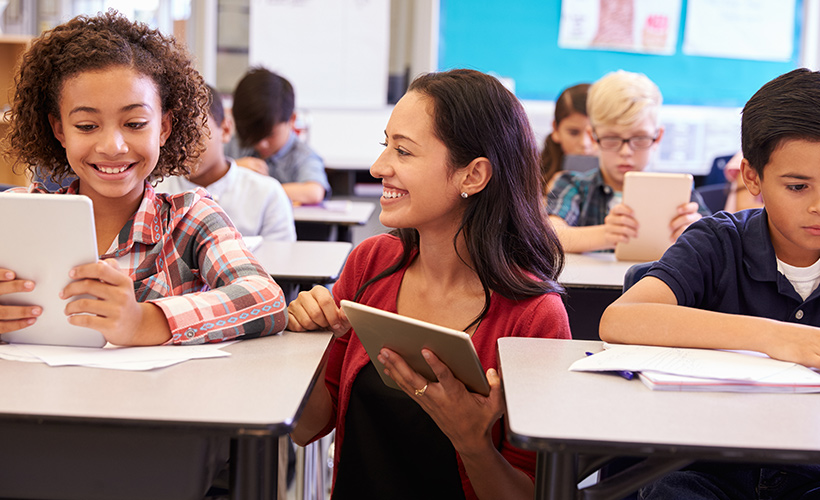Adding 4 Cs to the 3 Rs: 21st-Century Skills in Today’s Classrooms

I remember when I was a kid, school was all about the Three Rs. This always irritated me because only one of them actually starts with an R, but I get the idea. Reading, Writing, and Arithmetic were the central goals of my primary and secondary school education, and as a lifelong bookworm I was more than happy to spend my days reading and writing. On the other hand, arithmetic is still my personal kryptonite. English and math classes were always given the highest priority, and I still see this emphasis today in standardized testing. For my last couple years of teaching eighth grade, my school shifted to a block schedule for English and math classes only, giving students two class periods of each.
Another facet of education has been gaining prominence, even starting back when I was a fourth grader reading my chapter books instead of doing my math homework and increasingly each year since. Skills that have come to be known as 21st-Century Skills are now underlying every subject in K12 schools, as education adds Four Cs to the Three Rs: Critical Thinking, Communication, Collaboration, and Creativity.
What Are 21st-Century Skills?
 Depending on the context, there is quite a variety of skills that could be lumped under the term “21st century,” from technological literacy to social skills. Out of curiosity, I texted a couple friends, including teachers, instructional designers, and my mom, to ask what comes to mind when I say “21st-century skills.” Most responses centered around computers, cell phones, and other emerging technologies, as well as internet literacy. Another added communication, relationship building, and emotional intelligence to the mix.
Depending on the context, there is quite a variety of skills that could be lumped under the term “21st century,” from technological literacy to social skills. Out of curiosity, I texted a couple friends, including teachers, instructional designers, and my mom, to ask what comes to mind when I say “21st-century skills.” Most responses centered around computers, cell phones, and other emerging technologies, as well as internet literacy. Another added communication, relationship building, and emotional intelligence to the mix.
I personally like the Framework for 21st Century Learning by Battelle for Kids. This framework is meant to be a “unified vision for learning to ensure student success in a world where change is constant and learning never stops.” The Four Cs make up one component of the overall framework known as the Learning and Innovation Skills. They also include Life and Career Skills, as well as Information, Media, and Technology Skills. All of these wrap around the foundation of those Three Rs that influenced my early education. This is why I prefer this framework: it acknowledges all aspects of learning and how they work together to create a unified learning experience.
Critical Thinking

Critical-thinking skills are important for all subject areas and beyond. Critical thinking includes reasoning and problem solving (Battelle for Kids, 2019). In every subject, students need to be able to analyze and evaluate information to make judgements and draw conclusions. I believe that the central goal of education is to develop critical-thinking skills.
I’ll admit that I was absolutely that student who asked, “Why do I need to learn long division when I have a calculator?” As an educator, I now understand that it was never about long division itself. It was about learning to learn and learning to process through difficult problems. I’ve seen the story floating around social media of a teacher who explains to student athletes that it’s just like lifting weights to prepare for a football game. Players will never need to lift weights on the field during the game, but doing so is an important part of their preparation for what they will do on the field. I like that analogy.
Communication
Communication skills are crucial life skills for everyone and connect to two of those Rs: reading and writing. Students need to be able to both articulate messages through oral, written, and nonverbal communication as well as listen and interpret messages from others (Battelle for Kids, 2019).
As an English teacher, I was often faced with that same question I used to ask my math teachers: “Why do I need to learn this?” My answer was always that they were learning to communicate. Whether they were reading and analyzing the message in a famous speech or writing a personal memoir, every action was meant to develop their communication skills. Of all the skills I hope my students had when they left my classroom, communication is absolutely one of the most important because it will impact every aspect of their lives.
Collaboration

Collaboration goes hand-in-hand with communication, and the Framework for 21st Century Learning even lists them together in their definitions document (Battelle for Kids, 2019). Collaborative skills include communication plus flexibility, responsibility, and respect.
If I’m honest, collaboration is an area that has never come easy for me. I have caught myself thinking if you want it done right, do it yourself. Being a good collaborator means learning to manage those intrusive thoughts. As an instructor, I use partner and group work to help my students practice their collaboration while building support systems to help them build skills in flexibility, compromise, and mutual respect.
Creativity
Finally, creativity is my personal favorite of the 21st-century skills and one that I feel is too often overlooked. Creativity is an important aspect of each of the other 4Cs (Battelle for Kids, 2019). Critical thinking often requires creative problem solving. Communication can come in many creative forms, from infographics to short stories. Collaboration involves synthesizing diverse and creative ideas toward the group goal.
In my opinion, the most important aspect of creativity is learning through failure. I always try to show my students that failure is an opportunity to grow. I love the way that Framework for 21st Century Learning puts it: “understand that creativity and innovation is a long-term, cyclical process of small successes and frequent mistakes” (Battelle for Kids, 2019). It reminds me of the late Sir Ken Robinson’s 2006 TED Talk, which happens to be at the top of my list of frequently rewatched TED Talks. He made the assertion that “what we do know is, if you’re not prepared to be wrong, you’ll never come up with anything original.” (Robinson, 2006)
References:
Battelle for Kids. (2019). Framework for 21st century learning. https://www.battelleforkids.org/networks/p21/frameworks-resources
Robinson, K. (2006). Do schools kill creativity? TED. https://www.ted.com/talks/sir_ken_robinson_do_schools_kill_creativity